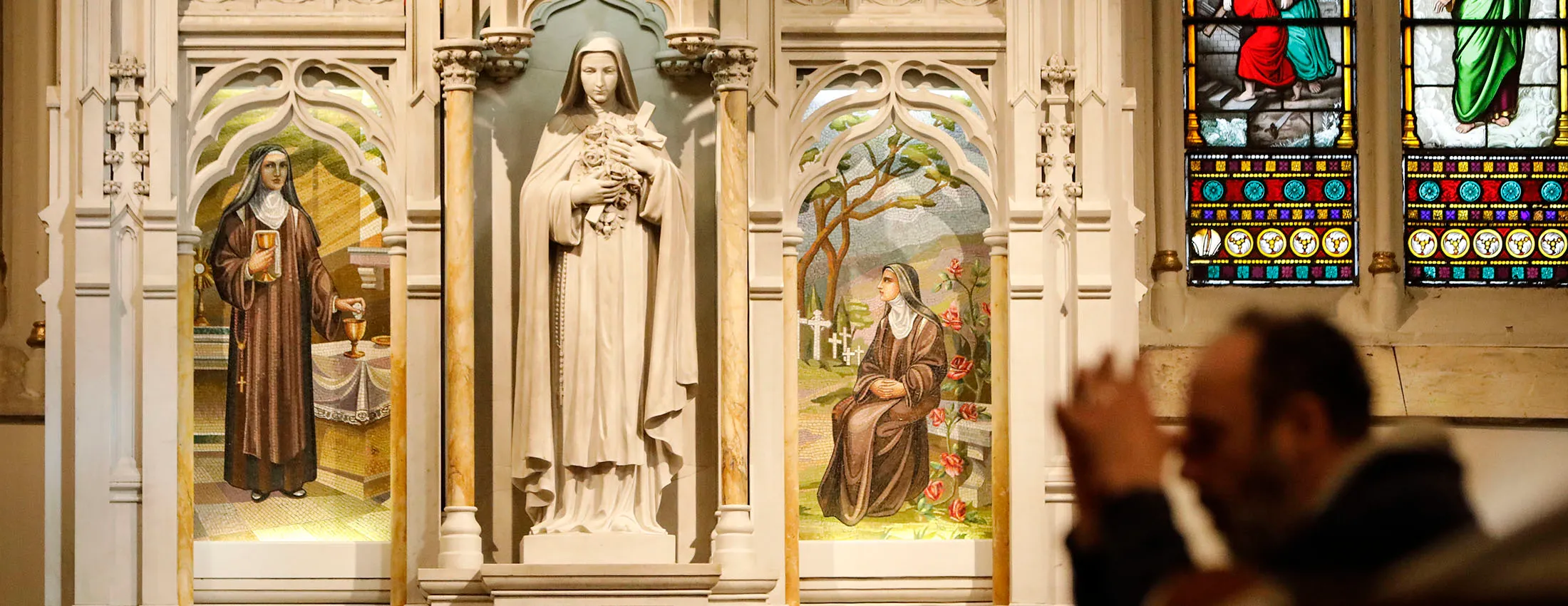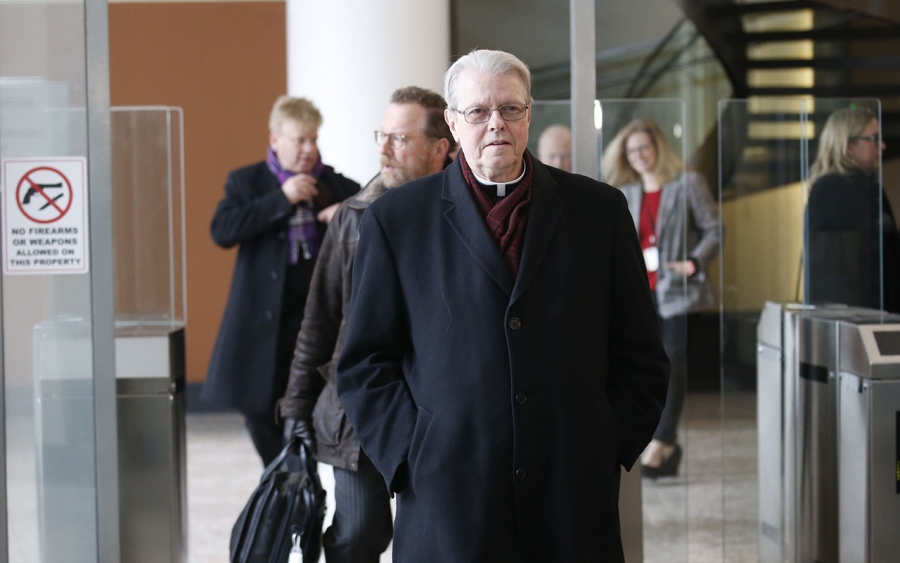Buffalo Diocese Files for Chapter 11 Bankruptcy
By Jay Tokasz
The Buffalo Diocese, awash with lawsuits alleging child sex abuse by priests, nuns and others, filed for Chapter 11 bankruptcy protection on Friday, marking another chapter in a scandal that has rocked the Catholic Church in Western New York since early 2018. The Buffalo Diocese already is named as a defendant in 260 cases, more than any other institution in the state, and potentially faces huge losses if the cases go to trial. “We’re going to be OK,” Bishop Edward B. Scharfenberger said Friday morning inside the Robert H. Jackson U.S. Courthouse prior to a hearing before Chief U.S. Western District of New York Bankruptcy Court Judge Carl Bucki. “We’re trying to do the right thing.” A half-dozen lawyers accompanying Scharfenberger lugged in boxes of documents. The filing puts the lawsuits on hold and stops efforts by debtors to collect from the diocese. It does not mean that the diocese or its parishes are going out of business. The diocese's voluntary petition for non-individuals listed assets of $10 to $50 million and liabilities of $50 to $100 million and said the diocese had between 200 and 999 creditors. "The Diocese does not seek Chapter 11 relief to shirk or avoid responsibility for any past misconduct by clergy or for any decisions made by Diocesan authorities when addressing that misconduct," Charles Mendolera, executive director of financial administration for the diocese, said in an affidavit that accompanied the bankruptcy petition. "The Diocese does not seek bankruptcy relief to hide the truth or deny any person a day in court. In fact, the Diocese is committed to pursuing the truth and has never prohibited any person from telling his/her story or speaking his/her truth in public." The diocese, in a statement, said it hoped the proceedings would allow it to "continue uninterrupted its mission throughout Western New York" while it settles its claims. “Our decision to pursue Chapter 11 reorganization – arrived at after much prayer, discernment and consultation with the College of Consultors and our Diocesan Finance Council – is based on our belief that this approach will enable the most number of victim-survivors of past sexual abuse in achieving fairness and a sense of restorative justice for the harm they have experienced," said Scharfenberger, apostolic administrator of the Buffalo Diocese, in a statement released shortly after the bankruptcy documents were filed in U.S. Bankruptcy Court.
Scharfenberger said he would meet with reporters Friday afternoon to discuss the bankruptcy proceedings. Advocates for abuse victims said the diocese's move was disappointing but not unexpected. Attorney Jeff Anderson, whose firm represents more than 100 clients suing the diocese, said the filing was an effort to continue "to conceal the truth about predator priests in this diocese." The Survivors Network for those Abused by Priests, also known as SNAP, released a statement saying: "In short, by declaring bankruptcy, church officials in Buffalo can refuse to take responsibility for abuse and cover-ups that occurred within under their watch." The Rev. Peter J. Karalus, vicar general, said in an affidavit that the diocese hopes for a quick resolution – an unlikely scenario given the length of time other dioceses have taken to emerge from bankruptcy proceedings. "A swift exit from bankruptcy is of the utmost importance given the Diocese's limited resources and because it is a not-for-profit religious organization," Karalus wrote. The petition was signed by Mendolera and attorney Stephen Donato of the Bond, Schoeneck & King law firm of Syracuse. The Buffalo Diocese became the second diocese in New York to file for bankruptcy reorganization, following the Rochester Diocese, which filed Sept 12. Since 2004, 23 dioceses across the country – including the Diocese of Harrisburg, Pa., last week – have sought bankruptcy protection in their efforts to settle lawsuits over clergy sexual abuse of children. Settlements in previous diocese bankruptcy cases have ranged from a low of $9.8 million in the Diocese of Fairbanks, Alaska, in 2010 to a high of $210 million in the Archdiocese of Saint Paul and Minneapolis in 2018. Insurance covered from 15% to 85%, depending on the diocese. The diocese already paid $17.5 million to 106 victims in 2018 under a voluntary compensation program. Victims who accepted cash offers, which varied from as low as $2,000 to as high as $650,000, relinquished their right to sue. The filing comes six months into a one-year window of the Child Victims Act that allows previously time-barred childhood sex abuse lawsuits to proceed in court. Buffalo Diocese officials said in court papers that the diocese doesn’t have enough assets to pay its creditors and that they expect more than 400 people to eventually file abuse claims. Some Child Victims Act lawsuits already have trial dates in place. All of those cases will be stayed in state court and likely transferred into U.S. Bankruptcy Court for adjudication. Based on past diocese bankruptcies, most, if not all, of the sex abuse cases against the diocese now are unlikely to go to trial. Childhood victims of clergy sex abuse have railed against the bankruptcy filings, saying they allow dioceses to continue hiding how they covered up abuse and shuffled child-molesting priests among parishes. But the bankruptcy filing will put the Buffalo Diocese’s finances under a microscope and likely set off clashes over what assets are available for settlements. Parishes and other Catholic entities such as hospitals and Catholic Charities are separately incorporated and are not part of the bankruptcy filing. Committees of creditors in other diocese bankruptcies nonetheless have pushed hard to include the assets of parishes, schools, cemeteries and other Catholic entities as part of the bankruptcy estate. The Buffalo Diocese listed total assets of $44.9 million in its most recent financial statement, including cash, investments and real estate, and liabilities of $20.5 million. Its total net assets were $24.4 million, the lowest level since 2002. The diocese's 2020 financial statement showed that the diocese ended its 2019 fiscal year $5 million in the red, primarily due to a big decline in donations. It was the second year in a row that the diocese operated at a loss of more than $1 million. In 2018, the operating deficit was $1.8 million. The value of 161 Catholic parishes and 34 elementary schools is not known. Those are not included in the diocese's annual audited financial statement. Also not included are separately incorporated nonprofit organizations such as Catholic Health, Catholic Charities, Baker Victory Services and the Foundation of the Roman Catholic Diocese of Buffalo, which combined have more than $100 million in net assets. The bankruptcy court ultimately will decide if any of those assets can be used toward settlements. It's unclear what immediate impact, if any, the bankruptcy filing will have on parishes and schools. The Buffalo Diocese has hired Syracuse-based law firm Bond, Schoeneck & King to represent it in bankruptcy court. The same firm is handling the Rochester Diocese's bankruptcy case. Amid furor over his handling of abuse and misconduct cases, Bishop Richard J. Malone on Dec. 4 relinquished his leadership of the diocese. Malone acknowledged in September that he was considering a bankruptcy filing, saying he was waiting to make a decision until diocese officials sorted through parish insurance policies from decades ago to find out what coverage might have been in place to cover sex abuse claims. Continental Insurance Co. has already sued the diocese, arguing in court papers that policies it may have issued to the diocese more than 40 years ago don’t apply to childhood sex abuse lawsuits being filed now against the diocese or the $17.5 million in voluntary settlements. Scharfenberger, who is bishop of the Albany Diocese and replaced Malone as apostolic administrator of the Buffalo Diocese until the pope appoints a new permanent bishop, also acknowledged in his first news conference that he would have to decide on whether to pursue bankruptcy in response to the Child Victims Act lawsuits. "The prime concern that we have is that the good works that we do can continue and not be impeded, and also that all of those who have legitimate claims and need to helped ... are not deprived of that, as well," said Scharfenberger. "There's a limited amount of assets and resources to go around and the challenge is to make sure they get properly and fairly distributed." In an Jan. 6 interview with The News, Scharfenberger characterized a bankruptcy filing as a "probability" for the diocese. The diocese's financial statement, published in the February edition of Western New York Catholic, declared a Chapter 11 filing to be "imminent." Earlier this week, the bishop met with about 125 priests to discuss the likelihood of a bankruptcy filing and what it could mean for the diocese and its 161 parishes. Two lawyers from Bond, Schoeneck & King joined the bishop in fielding questions. The bishop then met with College of Consultors, a small group of adviser priests, and with the Diocese Finance Council, to get their approvals to move ahead with a bankruptcy filing. The bankruptcy filing was the latest blow for more than a half-million area Catholics, who are weary and frustrated by a continued drumbeat of bad news about the diocese, which began after a retired priest Norbert Orsolits admitted to The Buffalo News in February 2018 that he had molested probably dozens of boys decades ago. A stream of revelations of childhood sex abuse involving dozens of other priests followed, prompting Malone's secretary to leak internal documents to media outlets, a civil investigation by the state Attorney General's Office, an FBI probe including a subpoena of diocese records and international media attention. Malone had rejected for more than a year repeated calls from some Catholics, including a handful of clergy, to step down. The Vatican ordered an "apostolic visitation," sending Bishop Nicholas DiMarzio of the Brooklyn Diocese to investigate Malone and the Buffalo Diocese. Even before lawsuits under the Child Victims Act started being filed Aug. 14, the diocese already was facing financial distress, largely due to decreased giving at area parishes and the costs of the diocese's compensation program for clergy abuse victims. Some parishioners stopped giving in protest of the way the diocese has handled the abuse scandal, while others have withheld gifts because they are concerned the money would be used to pay settlements. In Rochester, Bishop Salvatore R. Matano characterized the Rochester Diocese's bankruptcy filing as a "time of restoration and renewal" for the diocese, and he denied that the diocese was using the Chapter 11 reorganization to gain a tactical advantage over abuse victims who had filed lawsuits. "A reasonable person would look at the claims and the demands that are before us, demands approaching $100 million. They can review our resources and would come to the conclusion that we could not minister to every victim who comes forward and help them out if we did not go this route," Matano said. "So we sincerely consider this to be the best course of action for the victims and to be able to serve the greatest number of victims and not to prolong the suffering they have already endured by lengthy trials and by very costly jury verdicts that could take our resources soon into the process." New York was among eight states and the District of Columbia this year that were suspending civil statutes of limitations in child sexual abuse cases. In addition, nine states since 2003 opened windows of time to file lawsuits over old abuse cases that had been time-barred.
|
.
Any original material on these pages is copyright © BishopAccountability.org 2004. Reproduce freely with attribution.

